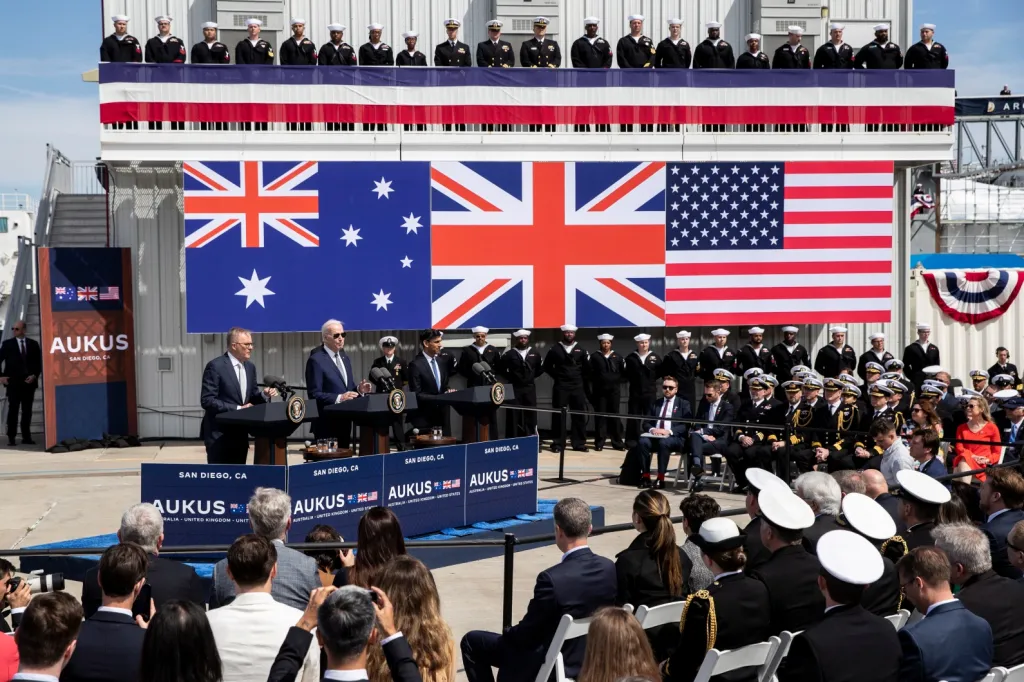International
Japan discuss cooperating with AUKUS on Pacific Ocean security and containing China

The militarization of the powers in the China Sea and the Pacific is set to increase. Kurt Campbell, the US Deputy Secretary of State, said on Friday that Japanese cooperation with the AUKUS defense alliance will be discussed in April between Japanese Prime Minister Fumio Kishida and US President Joe Biden, according to a senior US diplomat.
As a reminder, Fumio Kishida is due to meet the American head of state in Washington on April 10. The Japanese Prime Minister is also due to attend the first trilateral security summit between the USA, Japan, and the Philippines, which is scheduled to take place in the US federal capital the following day.
“There are clearly areas where Japan could bring substantial security and technology research capability to advance common goals in the Indo-Pacific,” said Kurt Campbell, the US Deputy Secretary of State.
These areas “include advanced robotics, cyber initiatives, and anti-submarine warfare projects,” continued the senior official in an interview with several media outlets, including the Japanese daily Nikkei, published this Friday.
Founded in 2021, the AUKUS alliance aims to strengthen defense ties between Washington, London, and Canberra against the backdrop of China’s growing military power in the Asia-Pacific region.
While the situation seems to be calming down, with Australia hailing the “stability” of its long-strained relations with Beijing on Wednesday during a visit to Canberra by the head of Chinese diplomacy, Washington’s allies still fear a war in the China Sea should Beijing invade Taiwan, a US ally. On Friday, 36 Chinese military aircraft were detected flying around the island state, according to the island’s Ministry of Defense. According to analysts, this is the largest deployment this year, in response to visits by a Taiwanese official to Europe.
One of the AUKUS alliance’s key areas of focus is cyberwarfare, artificial intelligence (AI), and the development of long-range hypersonic missiles.
In addition, one of the two pillars is to equip Australia with a fleet of powerful nuclear-powered submarines, a project that could cost up to $240 billion over 30 years. But “Japan has made it clear that it is not interested at this stage in the first pillar” of the pact, said Kurt Campbell.
On this subject, Australia announced on Thursday a partnership with British defense group BAE Systems for the construction of future nuclear-powered submarines. Details were not given, but according to Australian defense officials, the partnership should result in the construction of at least five submarines. The first of these is to be built in Great Britain, while the others will be built at the Adelaide shipyard in southern Australia. Australian officials estimate that 20,000 people—technicians, metalworkers, electricians, and welders—will be needed to complete the project.
On Friday, Australia affirmed that the agreement would “go ahead.”. “The three governments involved are working at a steady pace to make this happen,” Australian Defense Minister Richard Marles told reporters. “It’s going to happen, and we need it to happen,” he added.
Australia currently has a fleet of aging diesel-electric submarines, plagued by design flaws. Canberra hopes to have eight nuclear-powered vessels by the 2050s. It is counting on a mix of new AUKUS-class submarines built in the country and the UK and Virgina-class vessels purchased from the USA.
Donald Trump threatens AUKUS
Nevertheless, after barely two years in existence, there are already signs that AUKUS and its main project could be under threat. Some fear that Donald Trump will abandon the pact if he wins the presidential elections in November and return to his “America First” foreign policy. At the same time, “America first” in the huge Pacific Ocean needs the help of allies or will reduce the US to a second-line player.






